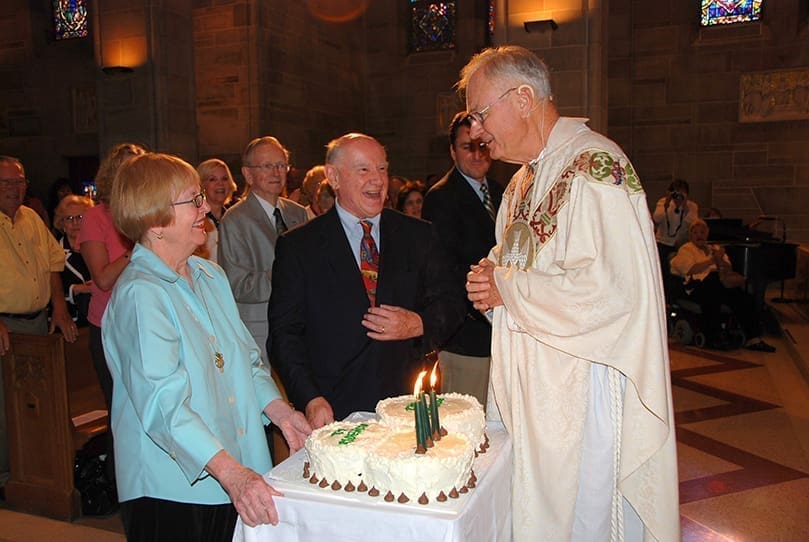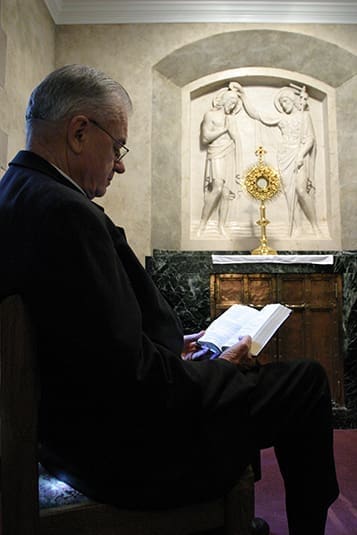 Photo By Cindy Connell Palmer/Archdiocese of Atlanta
Photo By Cindy Connell Palmer/Archdiocese of AtlantaAtlanta
After 54 Years, Priesthood’s ‘A Wonderful Life’
By ANDREW NELSON, Staff Writer | Published November 26, 2009
Father Richard Morrow is one of the longest serving priests in the Atlanta Archdiocese, ministering here since 1955.
Father Morrow is a walking history book, from his memories of being a Catholic priest in the Bible belt and sitting beside Ethel Kennedy as her husband, Robert, worked a room in west Georgia, to the changes of the Second Vatican Council and now being a semi-retired priest.
“It really is such a wonderful life. Everyone wants to feel needed and you sure have that feeling as a priest,” he says.
Father Morrow grew up in Connecticut and went to seminary in New York. The idea of serving in the United States, but where there was a special need for priests, appealed to him. He learned about Georgia, its small Catholic community and even smaller number of priests.
“There were hardly any diocesan priests. I think there were 42,” he says. (Today, there are 143 active priests.) The deal was sealed when visited and drove around in a borrowed car to see many of the 159 counties in the state “I liked the outlook of the priests. And you could do innovative (ministry), experiment, you might say. People were open for change, for the most part. And there was surely a need for priests.”
He was ordained in 1955 at his home parish in Stamford, Conn., and moved to Georgia when the Diocese of Savannah-Atlanta covered the whole state. When Atlanta became a diocese on its own in 1956, priests were assigned to one of the two dioceses based on which side of the dividing line the parishes fell.
Father Morrow’s fingerprints are on many places but especially at the seven parishes where he served as pastor. He helped start Our Lady of Perpetual Help Church, Carrollton, and St. Thomas the Apostle Church, Smyrna, now one of the largest in the state.
At 80 years old, Father Morrow has lived at the rectory of Christ the King Cathedral, on Peachtree Road, for 13 years. He celebrates Mass and other duties, but doesn’t miss the responsibilities that come with being a pastor. He plays golf weekly for the camaraderie and support. He was the guest of honor in August at birthday celebrations. He talks over lunch at a Buckhead sandwich and soup eatery where he has tuna salad on cranberry-walnut wheat bread and sips from a cup of black coffee. He removes the white tab from his black collar, leaving it open at the neck.
Father Morrow, who has a younger brother, tells funny stories. He worked during the Christmas holiday rush as a postman as a teenager. It became harder to do year after year because he lied about his age to first get the job so every year he had to remember his age from the previous year and add one.

Father Richard Morrow prays in the Cathedral of Christ the King adoration chapel. Photo by Michael Alexander
A self-described “brat,” he says his parents were suspect about whether he’d stay in seminary. Instead of buying the customary black suit to take to seminary, he says his father bought him a midnight blue suit figuring the young man might get more use out of it if he (or the seminary rector) decided that being a priest wasn’t for him.
He arrived in North Georgia in the mid-1950s, as the civil rights movement gained strength. He was pastor of Cedartown’s St. Bernadette Church. He recalls getting a phone call from a priest at St. Paul of the Cross Church, Atlanta, a historically black parish, and the parishioners were on the way to Alabama for a pilgrimage. The travelers wanted to stop at the church to use the restrooms and stretch their legs because public facilities weren’t open to them. When others in the community saw the buses of black people, they feared a protest, a “pray in” outside a local establishment, but that never happened, says Father Morrow.
“It was scandalous to me,” he says about the second-class status of blacks. In his experience, Catholics integrated without protests, he says.
More parishes followed, including St. Thomas the Apostle, which he helped to found. He says he moved around every six years with the belief that if he could not help church communities in six years, he likely never would.
His favorite Bible verse is Isaiah 49, which begins “Hear me, O coastlands, listen, O distant peoples. The LORD called me from birth, from my mother’s womb he gave me my name.”
Father Morrow says the message for him is how God is concerned about individuals and their wellbeing. “I, as an individual, count. He is interested in me. He is going to guide me.”
He is candid about how he found his way to the priesthood, almost despite himself.
“My parents encouraged me during my middle years to become a priest,” he says, “but they felt I had changed. I had become a brat. But I got to seminary, and I liked it.”
Father Michael Sullivan, a priest in Hartford, Conn., who was the assistant at his family’s church, was a role model. “He was so sincere and he had so much empathy for everybody.”
What does he think families can do to increase vocations to the priesthood?
“They could encourage their children, their grandchildren, their neighbor’s child to become priests, even if they are brats. I was a brat. There was a recent study that showed in most Catholic homes, young men were discouraged from becoming a priest by their own family. But it really is such a wonderful life.”